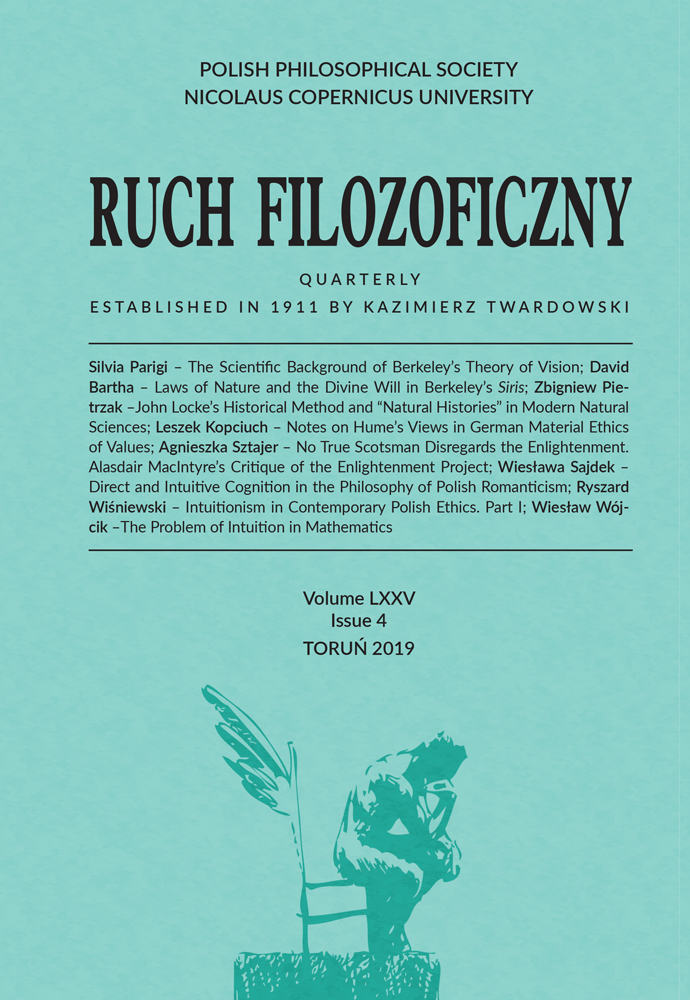The Problem of Intuition in Mathematics in the Thoughts and Creativity of Selected Polish Mathematicians in the Context of the Nineteenth-Century Breakthrough in Mathematics
DOI:
https://doi.org/10.12775/RF.2019.063Słowa kluczowe
mathematical intuition, studying of the foundations of mathematics, universality of mathematics, Polish School of Mathematics, mathematics of the turn of the 19th and 20th centuries, mathematics paradoxesAbstrakt
In the article, I examine the presence and importance of intuitive cognition in mathematics. I show the occurrence of mathematical intuition in four contexts: discovery, understanding, justification, and acceptance or rejection. I will deal with examples from the history of mathematics, when new mathematical theories were being created (the end of the nineteenth and the beginning of the twentieth century will be particularly important, including the period of establishing the Polish mathematical school). I will also refer to the research (mainly) of Polish philosophers and mathematicians in this field. The goal of the article is also an attempt to understand the breakthrough that took place in mathematics at the turn of the nineteenth century. The analysis also shows, by highlighting the specifics of intuition and mathematical creativity, the difficulties that arise when acquiring new concepts and mathematical arguments. Research goes in the direction of deepening research on the very phenomenon of intuition in cognition, by pointing to the universal nature of mathematical intuition.
Bibliografia
Brouwer Luitzen Egbertus Jan. 1910. “Zur Analysis Situs”. Mathematische Annalen 68: 422–434.
Janiszewski Zygmunt. 1910. “Nowy kierunek w Geometryi”. Wiadomości Matematyczne 14: 57– 64.
Janiszewski Zygmunt. 1918. “O potrzebach matematyki w Polsce”. Nauka Polska: 11–18.
Janiszewski Zygmunt. 1916. “O realizmie i idealizmie w matematyce”. Przegląd Filozoficzny 19: 161–170.
Janiszewski Zygmunt. 1913. “O rozcinaniu płaszczyzny przez continua”. Prace Matematyczno-Fizyczne 26: 11–63.
Janiszewski Zygmunt (ed.). 1915. Poradnik dla samouków, vol. 1. Warszawa: A. Heflich i St. Michalski (including the articles by Z. Janiszewski: Wstęp ogólny, 3–27; Wstęp do stopnia III, 115–141; Równania różniczkowe zwyczajne, 282–298; Równania funkcyjne, różniczkowe i całkowe, 299–314; Rozwinięcie na szeregi, 315–333; Topologia, 387–401; Podstawy gieometrji, 402–426; Logistyka, 449–461; Zagadnienia filozoficzne matematyki, 462–489; Zakończenie, 538–543).
Janiszewski Zygmunt, Kazimierz Kuratowski. 1920. “Sur les continus indecomposables”. Fundamenta Mathematicae l: 210–222.
Janiszewski Zygmunt. 1911. “Sur les continus irreductibles entre deux points”. Comptes Rendus, Paris 152: 752–755.
Janiszewski Zygmunt. 1912. Uber die Begriffe “Linie” und “Flache”. International Congress of Mathematicians, Cambridge.
Janiszewski Zygmunt. 1910. “Zur Analysis Situs”, Mathematische Annalen: 422–434.
Janiszewski Zygmunt, Kazimierz Kuratowski. 1920. “Sur les continus indécomposables”, Fundamenta Mathematicae 1.
Kac Marek. 1959. Statistical Independence in Probability, Analysis and Number Theory, vol. 12. New Jersey: The Mathematical Association of America.
Kant Immanuel. 1998. Critique of pure reason, transl. P. Guyer, A. W. Wood. Cambridge: Cambridge University Press.
Łukasiewicz Jan. 1929. Elementy logiki matematycznej. Warszawa: Komisja Wydawnicza Koła Matematyczno-Fizycznego Słuchaczów Uniwersytetu.
Łukasiewicz Jan. 1920. “O logice trójwartościowej”. Ruch Filozoficzny 5: 170–171.
Łukasiewicz Jan. 1930. “Philosophische Bemerkungen zu mehrwertigen Systemen des Aussagenkalküls”. Comptes Rendus de la Société des Sciences 23: 51–77.
Łukasiewicz Jan. 1922–1923. “Interpretacja liczbowa teorii zdań”. Ruch Filozoficzny 7: 92–93.
Łukasiewicz Jan. 1961. Z zagadnień logiki i filozofii. Warszawa: PWN.
Molęda Alicja, Zenon Piesyk. 1993. “Przegląd zmian programów nauczania matematyki w szkole podstawowej w latach 1963–1990 w Polsce”. Acta Universitatis Lodziensis. Folia Mathematica 6: 25–56.
Omyła Mieczysław. 2010. “Intuicja w naukach formalnych”. Edukacja Filozoficzna 50: 139–155.
Pogonowski Jerzy. Intuicja matematyczna w działaniu. http://logic.amu.edu.pl/images/5/54/Mo70jp.pdf. Access: 11.10.2019.
Pogonowski Jerzy. 2012. “Kilka uwag o intuicji matematycznej”. Filozofia Nauki 20, 2/78: 107–113.
Pogonowski Jerzy. 2011. “Mathematical intuition – a few remarks”. Investigationes Linguisticae 24: 1–24.
Poincaré Henri. 1911. Nauka i metoda, transl. M. H. Horwitz. Warszawa: G. Centnerszwer i S-ka.
Poincaré Henri. 1898. Sur les rapports de l’analyse pure et de la physique mathematique, w: Verhandlungen des ersten internationalen Mathematiker – Kongresses. Leipzig.
Poincaré Henri. 1908. Wartość nauki, transl. L. Silberstein. Warszawa: G. Centnerszwer i S-ka.
Poincaré Henri. 1897. “Związki pomiędzy analizą i fizyka matematyczną”, transl. S. Dickstein. Wiadomości Matematyczne 1.
Steinhaus Hugo. 1923. Czem jest a czem nie jest matematyka. Lwów: Księgarnia H. Altenberga.
Steinhaus Hugo. 1938. Kalejdoskop matematyczny. Lwów: Książnica Atlas.
Steinhaus Hugo. 2000. Między duchem a materią pośredniczy matematyka. Warszawa–Wrocław: PWN.
Śleszyński Jan. 1923. Rozwój pojęć nieskończonościowych. In: Poradnik dla samouków. Warszawa: A. Heflich, St. Michalski.
Śleszyński Jan. 1925. Teoria dowodu. Vol. 1, ed. S. K. Zaremba. Kraków: Nakładem Kółka Matematyczno-Fizycznego U.U.J.
Torretti Roberto. 1978. Philosophy of Geometry from Riemann to Poincaré. Dordrecht: D. Reidel.
Urbanik Kazimierz. 1973. “Idee H. Steinhausa w teorii prawdopodobieństwa”. Wiadomości Matematyczne 17: 39–50.
Vuillemin Jules. 1973. Poincaré’s Philosophy of Space. Space, Time and Geometry. Dordrecht–Holland: D. Reidel Publishing Company.
Wójcik Wiesław. 2014. Nowe idee topologiczne w pierwszych pracach twórców polskiej szkoły matematycznej. In: Historie matematyki. 257–270. Prague: The University of Prague.
Pobrania
Opublikowane
Jak cytować
Numer
Dział
Statystyki
Liczba wyświetleń i pobrań: 1605
Liczba cytowań: 0



